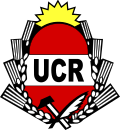Top Qs
Timeline
Chat
Perspective
1996 Buenos Aires City elections
From Wikipedia, the free encyclopedia
Remove ads
General elections were held in the City of Buenos Aires on 30 June 1996 to elect the city's first Chief of Government (mayor) and all 60 members of the Constituent Assembly, which was tasked with drafting and adopting a new constitution for Buenos Aires. These were the first elections ever held in the city to elect its local authorities, following the 1994 amendment of the Constitution of Argentina which granted autonomy to the city. Prior to the 1996 election, the mayor (intendente) was directly appointed by the President of Argentina.
Remove ads
In the mayoral election, Radical Civic Union senator Fernando de la Rúa won in the first round of voting with 39.89% of the vote. The electoral rules established for this election did not require for a second round of voting (which would be implemented by the 1996 Constitution of Buenos Aires, currently in place). Incumbent mayor Jorge Domínguez sought to continue in office but received only 18% of the vote.[1][2]
The legislative election resulted in a Constitutional Assembly controlled by the FREPASO, an alliance of centre-left and left-wing parties.
Remove ads
Background
Ever since the federalization of Buenos Aires in 1880, during the government of President Nicolás Avellaneda, the city of Buenos Aires – federal capital of Argentina – became a separate entity from Buenos Aires Province, operating as a non-autonomous city directly dependent on the government of Argentina. The Mayor of Buenos Aires (intendente) was from that point on appointed directly by the President of Argentina, while the city's Deliberative Council (Concejo Deliberante) served as the only democratically-elected local authority.[3]
In the 1990s during the presidency of Carlos Menem, calls for Buenos Aires to become politically autonomous grew, and the issue was one of the main points of the 1993 Pact of Olivos, which led to the 1994 amendment of the Constitution of Argentina.[4] The 1994 amendments (specifically article 129 of the new constitution) granted autonomy to the city, allowing it to vote for its own mayor for the first time in history.[5][6][7]
Remove ads
Candidates
Remove ads
Results
Chief of Government
Legislature
See also
References
External links
Wikiwand - on
Seamless Wikipedia browsing. On steroids.
Remove ads






